

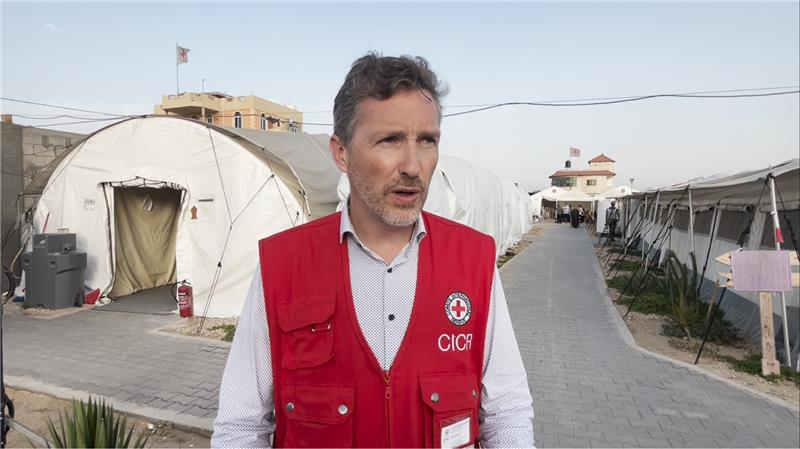
The International Committee of the Red Cross has been a quiet but vital player in the release of the hostages over the two years of war since the Hamas attacks of October 7, 2023.
It will assume that role again on Monday morning.
In the lead-up to the anticipated release of the remaining living hostages and most of the bodies of dead hostages, the Israeli government’s hostage point man, Gal Hirsch, has been holding intensive conversations with the head of the Red Cross in Israel, Julien Lerisson, and other ICRC officials.
“In recent hours, intensive discussions have been taking place between Israeli security officials and representatives of the Red Cross as part of the preparations for the reception of the hostages and the release of the prisoners,” the Prime Minister’s Office said on Friday.
Hamas representatives have also been meeting with the Red Cross to nail down arrangements for the hostages’ release.
“We’ve contacted each other much more,” Lerisson told The Times of Israel. He spoke about his conversations over the past week with Hirsch and IDF hostage representative Nitzan Alon, both former IDF generals.
“We are trying to revise the preparedness, the equipment, the logistics,” he said.
The release of the living hostages is expected to be carried out from at least three locations in Gaza — Gaza City, central Gaza, and Khan Younis.
The hostages will be handed over to Red Cross representatives by Hamas and will then be brought to IDF troops waiting inside Gaza.
They will then be escorted outside of Gaza to the military’s Re’im base near the border for an initial physical and mental health checkup. Some family members of the hostages are expected to wait at the Re’im facility for their loved ones.
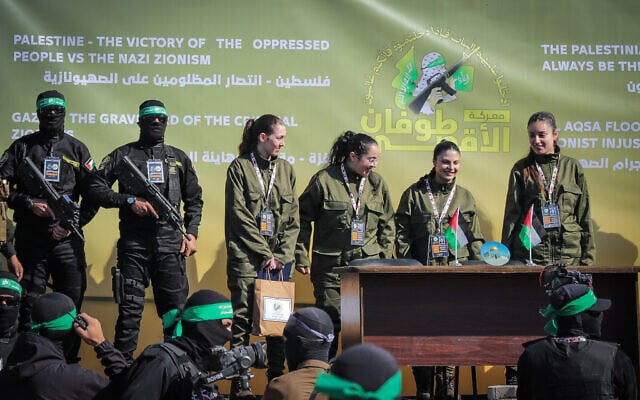
The ICRC has demanded from Hamas that there be no public ceremonies ahead of the releases, displays which the terror group shocked the world with during the last ceasefire in January.
“We really insist on the dignity of the hostages,” said Lerisson. “This circus, sorry to say, around the hostages and the propaganda machine, this is outrageous, and we only condemn and disagree with it.”
“We insist that it not happen,” he said.
According to the IDF, Israel does not expect Hamas to hold any public ceremonies.
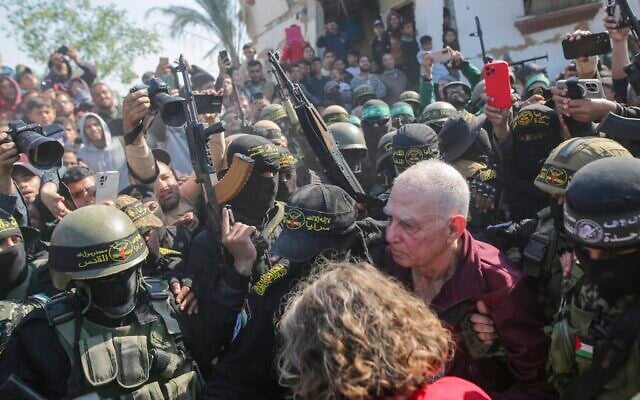
The Red Cross has also told Hamas that it will not accept a repeat of the threatening crowds that surrounded hostages Arbel Yehoud, Gadi Mozes, Pongsak Thenna, Sathian Suwannakham, Watchara Sriaoun, Bannawat Seathao and Surasak Lamnau as they were handed over to the ICRC in January.
“We don’t want the crowd, as you’ve seen in the previous operations,” Lerisson explained.
There is no guarantee, however, that the sides will accept the ICRC guidelines.
“We set and push forward our parameters,” said Lerisson. “Those are not conditions.”
“At times, we have to compromise and our parameters are not respected,” he said.
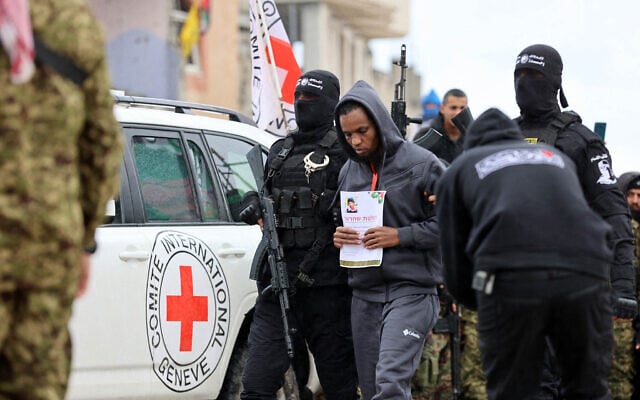
Sometimes, one of the parties makes changes at the last minute and fails to live up to its commitments. “Then we need to quickly be able to decide what do we do,” said Lerisson. “Do we cancel the operation? Do we move forward? For us, bringing back the hostages, bringing back the detainees, it’s our mission.”
Both sides have told him that they intend to honor the ICRC guidelines, he said.
The organization has been in intensive contact with Israel over the fine details of the releases: “How we receive the hostages, in which conditions they are, how we can provide support to the hostages, where do we bring them, where can the IDF receive them.”
For the ICRC, it means a constant review of every detail of operation on its end.
“We are reviewing our equipment, our logistics, our cars, our security, our teams, having the right person, the medic, the team leader, the security, all the different team members,” Lerisson explained, “and how we can review and make sure we are as prepared as we can for such a difficult and risky operation.”
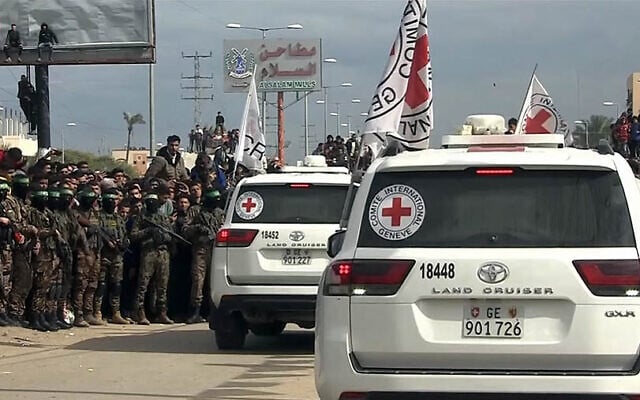
The ICRC also has to be ready for the unexpected.
“We need to be able to focus and communicate and arrive on the spot because the routes might change, the pick-up point might be different,” said Lerisson. “The roads are heavily destroyed in the Gaza Strip, so we wouldn’t be able to access the area.”
The organization is also preparing for the unique challenge of transferring the remains of the slain hostages.
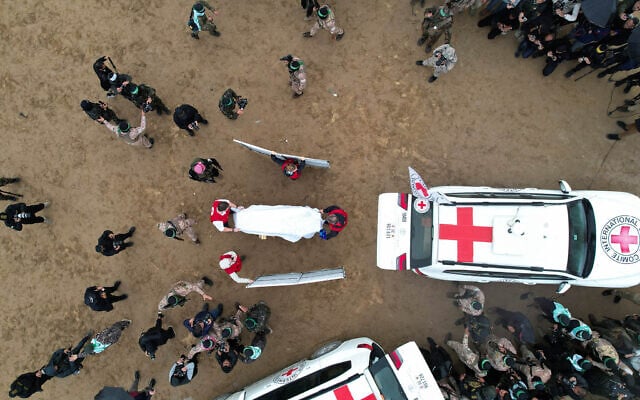
“We have specialists who are working on the protocol and making sure that international standards are respected,” said Lerisson. “It’s about the dignity of the dead. It’s about the coffin. It’s about the protocol and how we can make that as respectful as possible.”
“For us, it’s really about making sure everything is done to respect the dignity of the dead, and that it’s difficult enough not to add insult to injury,” he continued. “It’s really important, and that’s something we work on closely with the IDF, but also with Hamas, and making sure that we do our very best for the dead.”
The ICRC, founded in Geneva in 1863, has more than 18,000 staff in over 90 countries. It is dedicated to aiding victims of war, including by visiting prisoners and detainees, but has faced heavy criticism in Israel since October 7, 2023, for its failure to secure any meaningful aid for the 251 hostages taken by terrorists that day — whether by monitoring their conditions or providing them with basic humanitarian assistance, including medicine.
For its limited role in facilitating the transfer of freed hostages from Hamas to Israeli forces — both during a November 2023 ceasefire and the current one — many Israelis have come to derisively refer to the ICRC as little more than a glorified taxi service.
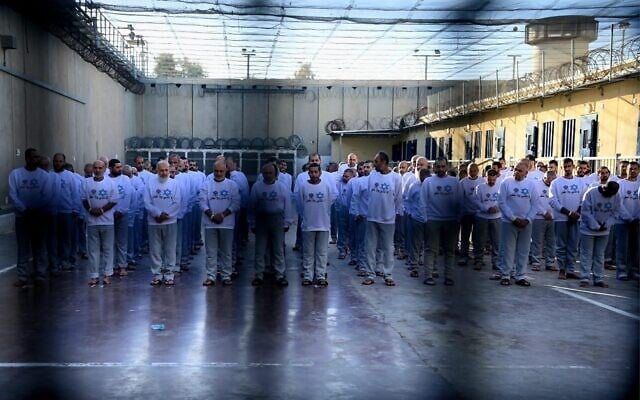
In response to Hamas’s refusal to allow ICRC visits to its hostages, Israel has blocked the agency’s visits to Palestinian prisoners held in Israeli jails, leading to criticism on that front as well.
The Red Cross has defended its actions during hostage releases, saying in a statement that “ensuring the safety and security of the handover operations is the responsibility of the parties to the agreement.”
The organization has also said in the past that, despite issuing appeals on the matter, it had no way to force Hamas to give it access to hostages.
In late 2023, Israel’s then-foreign minister Eli Cohen said the Red Cross had “no right to exist” if it did not visit the hostages in Gaza.
The organization insists it relies on the belligerents’ goodwill.
“From day one, we have called for the immediate release of all the hostages, and for access to them,” it said in a statement.
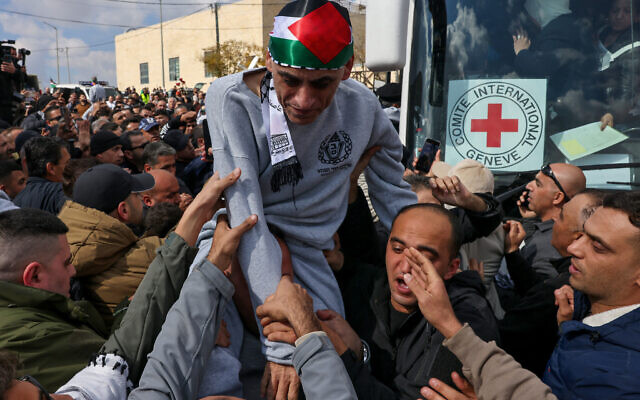
“We never managed to visit the hostages,” Lerisson acknowledged. “Yes, Hamas never granted access. But it’s not that they never gave access because we didn’t try, or we just dropped the ball. We keep on pushing, we keep on trying, family news, any proof of life, food, medicines, anything we can do.”
At the same time, the ICRC has been accused by pro-Palestinian activists, particularly on social media, of not putting pressure on Israel to secure visits to Palestinian detainees since October 7, and also of not doing enough to help the wounded in the Gaza Strip.
The ICRC is also demanding that Israel grant access to the Palestinian prisoners, said Lerisson. “It’s part of the Geneva Convention, it’s part of our work. We are also exchanging and insisting on that.”
Right now, however, the intense focus is on the complex operation expected to take place on Monday.
“I want the Red Cross to be able to bring back all the hostages, as soon as possible,” said Lerisson, “be they living or deceased.”

